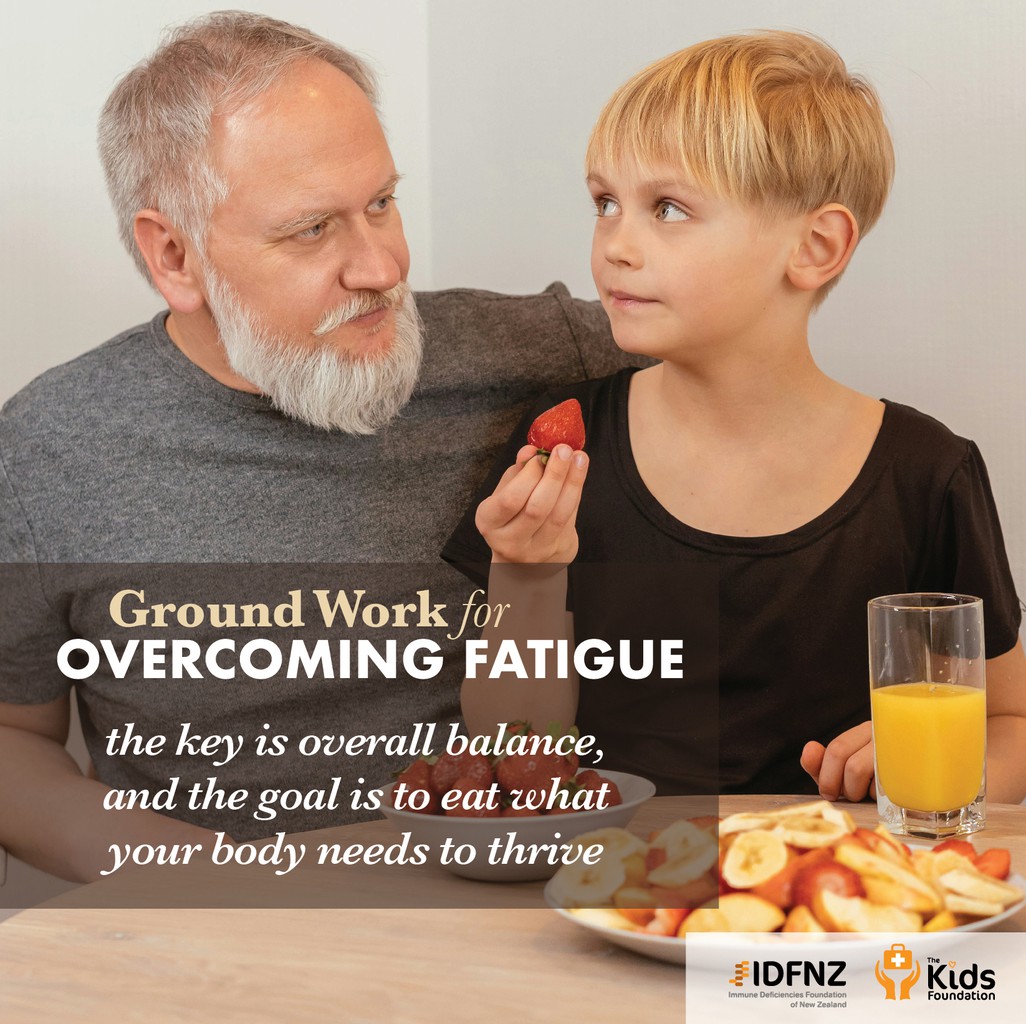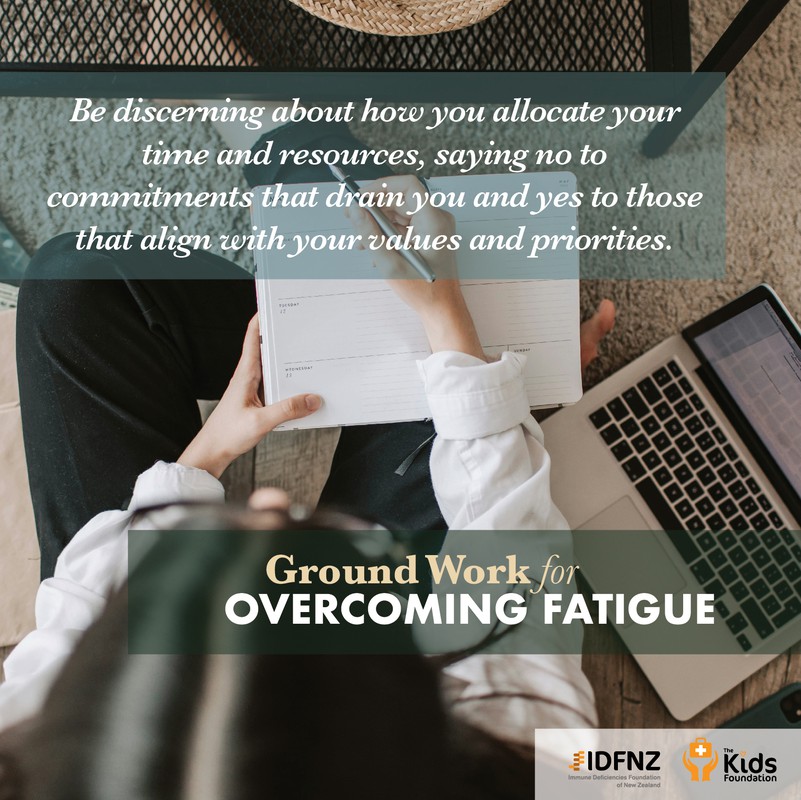Ground Work for Overcoming Fatigue - Strategies for Overcoming Fatigue: A Holistic Approach
Wed April 2nd 2025

The key is overall balance, and the goal is to eat what your body needs to thrive

Check in with your doctor
There is no single treatment for fatigue – because management depends on the cause or causes of your tiredness. The first port of call is to undertake a thorough health check with your doctor to find out if there are any underlying condi
tions (outside of your known illnesses) that unveil an explanation for your fatigue. This may involve blood tests, screening, and other physical function tests. You may be no stranger to this - however, it is good to get checked regularly if you have noticed a change in your general well-being. If the diagnostic process finds no further physical conditions or explanations for the fatigue you may be experiencing, the following lifestyle and multi-faceted approaches may help to resolve it. These encompass various aspects of physical, emotional, and psychological well-being.
1. Prioritize Sleep and Rest
It may be the most obvious step to take - but make sure that you have good sleep habits and are getting adequate sleep. Consider over the last month how well you’ve slept, how you feel when you wake, and if anything is hampering your ability to sleep. Establishing a good routine with consistency is key when it comes to sleep. Set a regular sleep schedule (as much as life allows) aiming for at least seven hours of quality sleep each night.
If you find yourself fatigued during the day, allow yourself to take a short nap to recharge. If your lifestyle has room for this - it can give you a boost if you’re lacking in the sleep department. However, this comes with a warning - keep it brief (around 20-30 minutes) to avoid disrupting nighttime sleep patterns. You may feel a little groggy immediately after, but you will notice as the day goes on you have more energy in the tank. Daytime naps might be a temporary thing until you can rid yourself of the fatigue.


2.Manage Stress:
Stress is a master puppeteer, pulling the strings of our physiological and psychological states and contributing to fatigue. When we are stressed, the body's fight-or-flight response is triggered, releasing a surge of hormones like adrenaline and cortisol. While these chemicals are useful for immediate action, having them persistently present drains our energy reserves, leaving us exhausted. The constant state of alertness wears down the body's defenses. Over time, this depletes our stamina, making even the simplest of tasks feel impossible.
Try finding a way to manage your stress. Whether it’s dealing with the stressors themselves, using mindfulness and meditation, or deep breathing exercises to calm the mind. Take time to relax, whether it be at the end of a big day, or through mini breaks at work or home. Take a step back and look at areas in your life that could be adjusted to eliminate potential stress. You can’t rid yourself of stress entirely, but you can put things in place to lessen the impact it has on your life.
3. Maintain a Balanced Lifestyle:
What you eat, what you drink, and what you do, are the next things to think about if you’re struggling with fatigue. A well-balanced diet rich in fruits, vegetables, proteins, and grains is what your body needs. It’s tempting to grab for a quick ‘pick-me-up’ like a sugary snack or caffeine - but it can make you feel worse in the long run. While you don’t need to eliminate these things - the key is overall balance, and the goal is to eat what your body needs to thrive. This ‘balance’ is also achieved by incorporating regular exercise into your week. Find something that you enjoy or something that works with your lifestyle. It may be a walk during your lunch break, or an evening gym class - expending energy in this way actually increases your overall energy levels!
4. Set Realistic Boundaries
Learn to set boundaries around your workload and schedule to protect your energy and prevent an even deeper dive into exhaustion. Be discerning about how you allocate your time and resources, saying no to commitments that drain you and yes to those that align with your values and priorities.
5. Advocate for Yourself:
Establish a collaborative relationship with your healthcare team and communicate openly about your symptoms, concerns, and treatment preferences. They can offer personalised guidance and adjustments to help manage fatigue more effectively. Educate yourself about your immune deficiency condition and stay up to date on the latest research, treatments, and support resources available. Empowerment through knowledge helps you to advocate for your needs effectively. Focus on progressing through the fatigue rather than expecting perfection from day one.
6.Cultivate Gratitude
When your mind has space to wander, try reflecting on the things you’re grateful for. Recent studies have shown that thinking about positive things in our lives improves cardiovascular health, boosts mental health, and benefits our resilience to stress. As a culture suffering from burnout and fatigue - gratitude is a simple, yet effective way to balance the sheer exhaustion of modern-day life. You’ll find after a few days/weeks that gratitude becomes ‘hard-wired’ into your perspective and serves as a tremendous tool in building resilience, and ultimately shaking fatigue.
Struggling with fatigue, while living with an immune deficiency illness presents formidable challenges, challenges that are unique and personal. You are not defined by your condition, but rather; you can be empowered by the resilience you gain, the courage you take, and your capacity to live life through the lens of gratitude and joy. There is a huge opportunity for growth, resilience, and self-discovery. By implementing lifestyle changes and strategies for managing fatigue, you can live intentionally and thrive despite life’s challenges. Taking charge of fatigue is not just about restoring energy - it’s about enhancing your overall well-being and reclaiming the vigor you once had for life. A life lived with intention, where every moment is embraced with purpose and positivity, becomes a testament to your strength and an inspiration to others.

